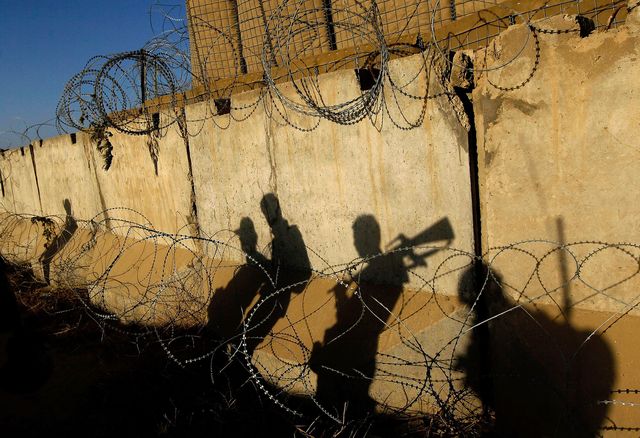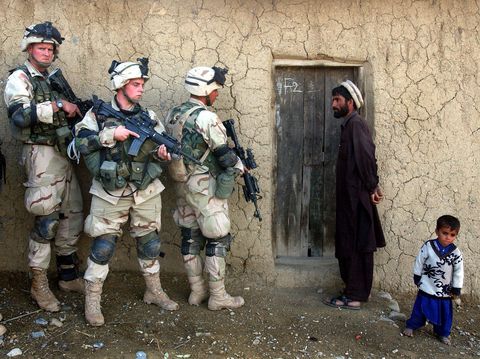
Chris HondrosGetty Images
John F. Kennedy was very fond of the old saw that victory has a thousand fathers, but defeat is an orphan. What we watched unfold in Afghanistan over the weekend, as the Afghan army dissolved, the Afghan government collapsed, and the president of Afghanistan ran for the hills, turned that mossbacked shibboleth on its head. For 20 years, we propped up an army that was an illusion and a government that was a mirage. For 20 years, as the Washington Post illustrated in a criminally unremarked-upon series of brilliant reports in 2019, our government lied to us and it lied to itself. This defeat had a thousand fathers, of both political parties, in uniform and out. They were in the business of war, the business of politics, and the business of informing the citizens of this country about both. All of them failed at their jobs, miserably, and the awful images from Kabul this weekend were precise measures of their failures—and, regrettably, ours.
For a number of years now, every time another spasm of violence happened in Afghanistan, I wondered just what in the hell we were still doing there. I understood the initial engagement; no American president could have survived not having retaliated after 9/11. I tried to understand the mission of the ground troops we sent in there despite the fact that I knew Afghanistan historically was a sinkhole that made Vietnam look like the War of Jenkins' Ear. I am not sorry at all that we iced Osama bin Laden the way we did. But still, what in hell were we still doing there? Didn’t we know about the British and the Soviets? Didn’t we know about Alexander the Great, who, after his great victory at Gaugamela, went into that area of Asia and promptly came apart? Frank Holt, in his Into the Land of Bones, explained the long, bloody comeuppance every great power had received when they meddled in that rocky corner of the world.
First, with exuberant expectations, the British Empire gathered in 1838 a grand army to quell the unruly Afghans. The goal was simply to replace one ruler (Dost Muhammed) with another (the exiled Shah Shuja) more amenable to British interests. “There have been few military campaigns in British history,” writes Major General James Lunt, “which were more ineptly planned and more incompetently executed than the first Afghan War; and that is saying a good deal.”…
…they placed Shah Shuja on the throne. This foreign intervention, however, stirred growing resentment among the native peoples even as most of the British troops swaggered back to India. Tribal opposition mounted across Afghanistan, erupting disastrously when terrorists butchered a prominent British official named Alexander “Bukhara” Burnes. In January 1842, the empire’s remaining 4,500 soldiers and their 12,000 camp followers retreated from Kabul in a long wintry death-march that only one European survived…The Second Afghan War (1878–1880) commenced with a swift invasion by 33,500 troops.
The Second Afghan War went as bloodily for Great Britain as the first one did, and a general named Sir Frederick Roberts concluded that the best thing for all concerned was to leave Afghanistan to the people who lived there. Roberts advised, according to Holt:
“It may not be very flattering to our amour propre, but I feel sure I am right when I say that the less the Afghans see of us the less they will dislike us. Should Russia in future years attempt to conquer Afghanistan, or invade India through it, we should have a better chance of attaching the Afghans to our interests if we avoid all interference with them in the meantime.”
(There was one upside to the Second Afghan War, albeit a completely fictional one: a Royal Army surgeon named John H. Watson was wounded there and rescued by his intrepid orderly, Murray. He returned to London, where he accepted an offer to share a suite of rooms at 221B Baker Street with an eccentric private detective named Sherlock Holmes.)

Scott NelsonGetty Images
Of course, Russia, then d/b/a the Soviet Union, ignored Sir Frederick’s warning and marched 100,000 troops into Afghanistan in order to put a puppet in place. The U.S. took Sir Frederick’s advice and “attached” the various tribal chieftains and warlords to our interests in order to bleed the Soviets the way every invader inevitably bleeds out in Afghanistan. That plan succeeded, and then we left, and the bill came due in the fall of 2001. And then we went back in, overtly this time. In 2008, a Russian veteran of their Afghan adventure named Ruslan Aushev gave an interview to the Toronto Globe and Mail.
"Canadians and Americans are learning the hard way. You have been there seven years and you have no prospect of early victory," said Ruslan Aushev, a highly decorated combat veteran who served two tours, totalling nearly five years with the Soviet army in Afghanistan. "We knew by 1985 that we could not win," he recalls. It then took Moscow four more years to extricate hundreds of thousands of troops from Afghanistan, while claiming victory on the way out. Afghanistan was plunged into civil war…"We could take any village, any town and drive the mujahedeen out," Mr. Aushev said, recalling his two combat tours, first as an infantry battalion commander and later in charge of a full Soviet regiment - roughly the size of the Canadian contingent in Afghanistan. "But when we handed ground over to the Afghan army or police they would lose it in a week.”
"The Taliban may not be able to win militarily but they can't be defeated and sooner or later the Western alliance will be forced with pullout," he warned. Support for the insurgents will grow the longer the foreign armies remain in Afghanistan, he said. Although the Soviets deployed more than 100,000 soldiers across Afghanistan - roughly double the number of U.S. and North Atlantic Treaty Organization troops currently deployed - and trained an Afghan army three times the size of Kabul's current security forces, it was never enough, Mr. Aushev said…"There will have to be an accord with the Taliban, because at least 50 per cent of the Afghan population supports them…It's impossible to conquer the Afghans ... Alexander the Great couldn't do it, the British couldn't do it, we couldn't do it and the Americans won't do it ... no one can.”
What the hell were we doing there, and why didn’t we listen to anyone who had been?
Now, as has been the case in so many of our recent wars, nothing is left but the bitter recriminations. The Taliban owns Afghanistan because they are the best organized power gang in the country. They likely will be as ruthless and retrograde as they were the last time. Whatever gains the women of Afghanistan had made under the umbrella of United States’ protection likely will be violently swept away. The seventh century will make one more comeback in the strange bell jar that is that country.
There is nothing we can do about any of that. There never was anything we could do about that, short of leaving a massive army of occupation there in virtual perpetuity. We had one specific purpose in mind—to bring to justice, one way or another, the people who had committed atrocities in this country on September 11, 2001. That we could do. That we did. And then some think-tank cowboys and honorarium-fattened hyenas decided to lie the country into an invasion of Iraq before our work in Afghanistan, whatever it was supposed to be, was done. Soon, we had two slow-rolling calamities on our hands, and Iraq shuffled Afghanistan off the main stage. This was another terrible idea. History shows that Afghanistan is a marvelous environment for those. There’s a limit to the crops you can grow there, but it’s a highly fertile place for Great Power foolishness.
This article originally ran as Charles P. Pierce's weekly newsletter, which you'll receive every Saturday as a member of Esquire Select.
We will now hear a lot from people who accuse us of betraying Afghanistan, as though 20 years, 2,400 KIA, and more than $2 trillion was insufficient. None of those people have produced an adequate answer to the question of what the hell we were doing there, and what the hell we would do there for the next 10, 20, or 50 years. Sooner or later, we have to learn the lessons of history, because we’ve been deaf to them for so long. In Vietnam, we should’ve learned that the only people who really want the places in which we choose to make war are the people who live there. But we didn’t, and Afghanistan is further proof of that. We hung around there until we became part of the historical architecture of the place. As Frank Holt writes:
When in turn the British, Russians, and Americans each seized Kandahar in southern Afghanistan, they occupied a city founded by Alexander himself and still bearing the Arabic version of his name. When U.S. troops charged on horseback against the Taliban strongholds of Mazar-i-Sharif, they rode past the crumbling walls of Alexander’s main camp, and the capital of the Greek kingdom that endured there for centuries.
What the hell are we doing in Afghanistan? Leaving, the way everyone always has.
This article has been updated to reflect the weekend's events.
Charles P. Pierce Charles P Pierce is the author of four books, most recently Idiot America, and has been a working journalist since 1976.
This content is created and maintained by a third party, and imported onto this page to help users provide their email addresses. You may be able to find more information about this and similar content at piano.io